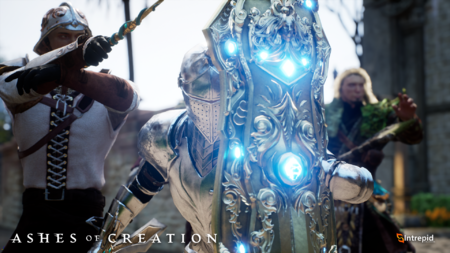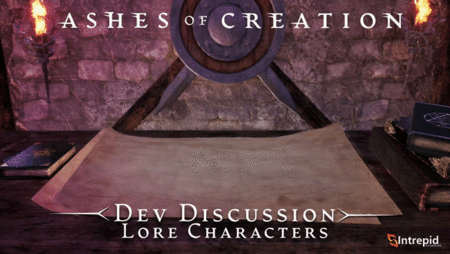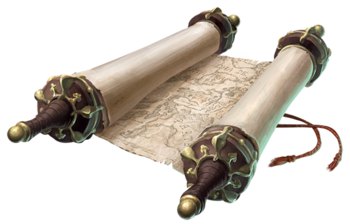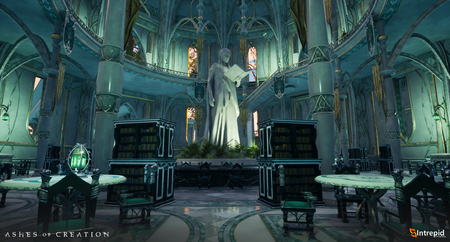Arcos argumentales
Los arcos argumentales impulsan la narrativa que se desarrolla en un servidor en concreto. Dentro de estos arcos argumentales hay puntos específicos que pueden cambiar para contar diferentes historias basadas en los parámetros del mundo.[2][3][4]
- Within the context of these story arcs, there are specific points that they can pivot to tell a different story. That different story can be based on predicates that are in the world: from a player decision standpoint, from a cultural representation standpoint, from situational to which node gets developed. There's a lot of different components that interact with the way the dialogue and narratives play out on a particular server; and what that means is- and I've said this from the beginning many sandbox MMORPGS, they do not create as much curated content as theme-park MMORPGS; and their excuse for doing that is because they incorporate player-driven mechanics. But that's a bit of a cop-out and it's the opposite approach that we've taken with Ashes of Creation; and the reason for that is, if you give the player a door and there's nothing behind that door then opening the door is meaningless. So what we have to do is we have to create a very functional story arc system that provides content in many different ways, but is behind a door of world progress or world development that is then executed by the player population. And that's how we construct our narrative systems.[3] – Steven Sharif
- Decisiones de los jugadores y líneas de misiones personales o de clase .[2][3][5][4]
- Es posible que algunos arcos argumentales deriven en un camino más oscuro/malvado, si el personajeasí lo elige.[6]
- Even player driven mechanics will still have story components. There will be a reason why the player driven mechanic is available or required of the player; so every system that's created touches a story.[5] – Steven Sharif
- Representación y líneas de misiones culturales.[2][3][4]
- Líneas de misiones regionales.[2][4]
- Every stage a node develops it's unlocking narratives, storylines, it's changing the spawn population of the area around it, changing what bosses exist, it's triggering events where you may have legendary dragons attack the city. It's basically writing the story of the server based on the actions and determination of the players. So, you may experience a dungeon one month earlier and have a completely different story that relates to this location the next month, because something has changed either geopolitically or from the node standpoint.[7] – Steven Sharif
Algunos arcos argumentales se pueden desbloquear a través del sistema de tablón de anuncios.Para poder acceder a las misiones de los arcos argumentales será necesario cumplir ciertos requisitos.[8]
- Los alcaldes necesitan ciertos recursos.[8]
- Los edificios son necesarios dentro de un nodo.[8]
- Es necesario completar las tareas de organización social.[8]
List of story arcs
- An Ancient Violence
- Dead Trees with Ghost Leaves
- Harrower Moon
- Relic of War
- The Blood Still Due
- The Enemy Within
- The Minotaurs
- The Pilgrim's Problem
- The Priestess and the Piper
#REDIRECT MediaWiki:Story arc quests/es
Las líneas de misiones pueden tener varias fases. Estas fases de cada misión pueden terminar en fallo.[9]
- La posibilidad de volver a intentar una misión fallida depende de la progresión del nodo.[9]
- Las misiones que implican a ciudadanos de diferentes nodos se desbloquean en función de las allianzas así como otras relaciones entre nodos y su progresión.[10]
- Las misiones pueden variar en función de la fase actual de los nodos cercanos, la influencia de la estación, y de eventos como jefes de mundo.[11]
There will be many different quests that actually have stages of the storyline; and these stages can actually be failed. You can actually fail a storyline; which sucks when you think about it, but at the same time that risk makes your investment that much more important.[9] – Steven Sharif
Misiones raciales
Varias misiones se basarán en la raza de un personaje.[12]
Distintas misiones podrían estar relacionadas con el principal contribuyente cultural de un nodo. Esto no bloqueará contenido, sino que añadirá sazón a las misiones.[12]
Es posible que hayan distintas versiones de la misión que existe para razas específicas; e incluso si se comparte una misión para eliminar un jefe, si tú eres humano y yo soy un elfo, yo podría tener un arco de misión que me lleva en una dirección distinta del tuyo, aunque hayamos tomado la misma misión. Y dependiendo de quién sea el principal contribuyente cultural del nodo, se abrirán nuevos arcos para las culturas que compartan raza con estos contribuyentes. No es que queramos bloquear contenido, sino que queremos darle más sabor a las misiones para que no sean todas iguales.[12] – Steven Sharif
La raza importa porque las distintas narrativas del juego se ven influenciadas por la cultura de los principales contribuyentes de un nodo... Si eres un Niküa y te encuentras en un nodo predominantemente Niküa, tendrás acceso a ciertos servicios o habilidades que los miembros de las otras razas no. Ellos podrían tener misiones alternativas, pero no específicas para su raza. Las misiones específicas de los Niküa estarán relacionadas a la meta-narrativa presente en el mundo y ellos podrán dirigir parte de esa narrativa. Esto será beneficioso para su raza, porque podrán desbloquear cierto contenido al cual las demás razas no tendrán acceso aún. Así que hay un fuerte incentivo de progresión por esa línea.[13] – Steven Sharif
Las misiones específicas para razas, títulos, o gremios probablemente no sean más del 10% de las misiones totales. El otro 90% estarán disponibles para todos.[14]
Narrativa impulsada por el jugador
El mundo de Verra será el mismo en cada servidor, pero los Nodos se desarrollarán de forma diferente. Cada servidor tendrá diferentes narrativas. Las cosas que sucedan en un servidor pueden no suceder en otro.[15]
- La narrativa deneral de Ashes of Creation es que los jugadores son los hijos de Verra que regresan, pero no serán considerados de forma individual como "salvadores"..[16]
We want as many people as possible to experience the main server Narrative. These will branch at different scales, but largely at the personal level. Where things change is at the Node level – different parts of the story will be unlocked based on where and when Nodes grow. Unlocking a part of the story in a certain way locks out progression of the story in a different way. You’ll see different antagonists, different NPCs, and different calls to action depending on what’s happening with the server at that time.[17]
It redefines what the players will experience in an MMORPG to come into a wilderness that is devoid of really any structure outside of what the community creates themselves; and then what can be created can be changed, if they want to experience a storyline that's been seen on another server, but you're fighting a dragon because you're near a mountain and the other server's fighting a Kraken because they're near the coast and you want to fight that Kraken because of its drop table. If you want to meta it or because you just want that under your belt: to be the server first to take out that Kraken and you have yet to develop the node there, it's incumbent upon you to manifest that in the game.[18] – Steven Sharif
Eventos de historia

Narrative Events help shape the story of Verra based on the choices that players make during key questlines. While narrative story arcs take time to develop across a server, Narrative Events will show players that their choices play a bigger part in shaping the world around them through individual actions.[19] – Peter Bisulca
Los eventos de historia permiten a los jugadores dar forma a los arcos argumentales que se desarrollan en su servidor a través de las elecciones que hacen en las misiones clave.[19]
- Es posible que algunos arcos argumentales se desarrollen hacia un destino más oscuro/malvado, si un personaje así lo elige.[20]
Historia en el servidor
El historial de cada servidor será registrado y se encontrará visible para los jugadores en la biblioteca de los nodos.[22][23]
- We're gonna keep track of the history of the world so that we can tell people the story up to the current day. A player who's brand new, who's come in at the six-month mark can take a look at each server, what each server has done, how each server has tackled the storyline; and they can decide for themselves what community they want to join; what version of the world that they want to take part in.[23] – Jeffrey Bard
- Los escribas pueden recopilar y registrar información sobre los acontecimientos del mundo tal y como los han vivido y desde su punto de vista.[24]
Bibliotecas
En la fase de Aldea (fase 3) el edificio exclusivo del nodo científico es la Biblioteca. Los jugadores pueden usar la Biblioteca para acceder a información, incluyendo (pero sin limitarse a) lo siguiente:[22]
- Historial de eventos narrativos y cuando ocurrieron.[22]
- Localización y última cantidad conocida de recursos recolectables.[22]
- A medida que los jugadores informen de la ubicación de los recursosen su biblioteca, los ciudadanos del nodo verán la información de esos recursos actualizada en su mapa.[25]
- Ubicaciones y ocupantes de nuevas mazmorras o PDIs (puntos de interés) que hayan aparecido.[22]
- Piedras de poder rúnico para armaduras.[22]
- Recetas de armaduras y armas comunes (nivel 25 e inferiores).[22]
Los registros de información en la biblioteca pueden caducar tras un periodo de tiempo (por ejemplo, una semana). Después de lo cual se requerirán nuevos informes para actualizar la información existente.[25]
You'll get that shroud of war functionality for the week after a report but if it doesn't receive a follow-up report after that expiration period then it will not be updating real time.[25] – Steven Sharif
Visuales
2024-03-03 2023-04-17 2023-04-01
Ver además
Referencias
- ↑ Forums - Dev Discussion #49 - Lore Characters.
- ↑ 2.0 2.1 2.2 2.3 2.4 Transmisión en vivo, 2022-04-29 (1:05:37).
- ↑ 3.0 3.1 3.2 3.3 3.4 Transmisión en vivo, 2022-03-31 (1:15:29).
- ↑ 4.0 4.1 4.2 4.3 4.4 Transmisión en vivo, 2018-01-18 (39:08).
- ↑ 5.0 5.1 Transmisión en vivo, 2019-05-30 (1:18:16).
- ↑ Transmisión en vivo, 2017-05-26 (15:37).
- ↑ 7.0 7.1 Vídeo, 2018-04-05 (35:01).
- ↑ 8.0 8.1 8.2 8.3 Transmisión en vivo, 2017-10-31 (29:50).
- ↑ 9.0 9.1 9.2 Entrevista, 2018-10-20 (2:36:25).
- ↑ Transmisión en vivo, 2020-07-25 (1:50:20).
- ↑ Transmisión en vivo, 2021-03-26 (1:12:51).
- ↑ 12.0 12.1 12.2 Pódcast, 2018-04-23 (29:56).
- ↑ Entrevista, 2018-05-11 (1:00:19).
- ↑ Transmisión en vivo, 2019-07-26 (1:13:23).
- ↑ Transmisión en vivo, 2017-05-19 (37:03).
- ↑ Transmisión en vivo, 2019-12-17 (1:10:30).
- ↑ Interview: Ashes of Creation on Building Their Virtual World, 2017-04-13.
- ↑ Transmisión en vivo, 2017-05-22 (28:02).
- ↑ 19.0 19.1 Types of Events on Verra.
- ↑ Transmisión en vivo, 2017-05-26 (15:37).
- ↑ Kickstarter packages.
- ↑ 22.0 22.1 22.2 22.3 22.4 22.5 22.6 22.7 Blog: Know Your Nodes - Scientific Node Type
- ↑ 23.0 23.1 Entrevista, 2018-04-20 (9:20).
- ↑ Transmisión en vivo, 2017-05-26 (51:37).
- ↑ 25.0 25.1 25.2 Pódcast, 2021-04-11 (27:34).




















